-
 SFWJ / Medcana Announces Strategic Expansion Into Australia With Acquisition of Cannabis Import and Distribution Licenses
SFWJ / Medcana Announces Strategic Expansion Into Australia With Acquisition of Cannabis Import and Distribution Licenses
-
Tokyo leads gains in most Asian markets on trade deal hopes

-
 Two missing after deadly spring snowstorm wreaks havoc in the Alps
Two missing after deadly spring snowstorm wreaks havoc in the Alps
-
'War has taken everything': AFP reporter returns home to Khartoum

-
 US strikes on Yemen fuel port kill 38, Huthis say
US strikes on Yemen fuel port kill 38, Huthis say
-
Slegers targets Lyon scalp in pursuit of Arsenal European glory

-
 'Defend ourselves': Refugee girls in Kenya find strength in taekwondo
'Defend ourselves': Refugee girls in Kenya find strength in taekwondo
-
China's manufacturing backbone feels Trump trade war pinch

-
 Sri Lankans throng to Kandy for rare display of Buddhist relic
Sri Lankans throng to Kandy for rare display of Buddhist relic
-
Chinese vent anger at Trump's trade war with memes, mockery

-
 Heartbroken Brits abandon pets as living costs bite
Heartbroken Brits abandon pets as living costs bite
-
Mongolian LGBTQ youth fight for recognition through music, comedy

-
 Cash crunch leaves Syrians queueing for hours to collect salaries
Cash crunch leaves Syrians queueing for hours to collect salaries
-
Lyon left to regroup for Champions League bid after painful European exit

-
 Unravelling Real Madrid face Athletic Bilbao Liga test
Unravelling Real Madrid face Athletic Bilbao Liga test
-
Napoli disturbing buoyant Inter's peace in Serie A Easter bonanza

-
 Disappointed Dortmund chase consistency with Europe at stake
Disappointed Dortmund chase consistency with Europe at stake
-
Asian markets mixed as traders track tariff talks

-
 Yan and Buhai share lead at LA Championship
Yan and Buhai share lead at LA Championship
-
Under fire at debate, Canada PM Carney tries to focus on Trump

-
 Liverpool poised for Premier League coronation, Leicester, Ipswich for relegation
Liverpool poised for Premier League coronation, Leicester, Ipswich for relegation
-
India's elephant warning system tackles deadly conflict

-
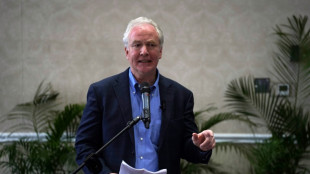 US senator meets wrongfully deported Salvadoran migrant
US senator meets wrongfully deported Salvadoran migrant
-
Gustavo Dudamel: the superstar conductor building bridges to pop

-
 Japan rice prices soar as core inflation accelerates
Japan rice prices soar as core inflation accelerates
-
US unveils new port fees for Chinese-linked ships
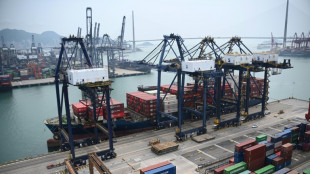
-
 First US 'refugee scientists' to arrive in France in weeks: university
First US 'refugee scientists' to arrive in France in weeks: university
-
Members of UK Jewish group launch broadside on Gaza war

-
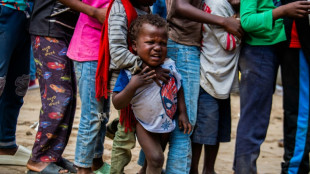 One million Haitian children face 'critical' food shortage: UN
One million Haitian children face 'critical' food shortage: UN
-
Spring snow storm wreaks deadly havoc in the Alps

-
 Man Utd buy time to make miserable season 'special', says Amorim
Man Utd buy time to make miserable season 'special', says Amorim
-
Netflix earnings top forecasts despite economic turmoil
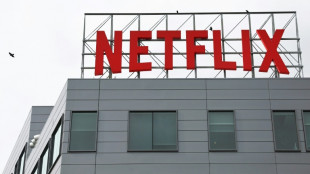
-
 Thomas three clear at RBC Heritage after sizzling 61
Thomas three clear at RBC Heritage after sizzling 61
-
Man Utd beat Lyon in Europa League epic, Spurs and Athletic Bilbao reach semis

-
 Frankfurt's Goetze sidelined with leg injury
Frankfurt's Goetze sidelined with leg injury
-
Spurs players 'never lost belief', says Postecoglou

-
 Man Utd stun Lyon in nine-goal Europa League classic to reach semis
Man Utd stun Lyon in nine-goal Europa League classic to reach semis
-
Netflix earnings in first quarter of 2025 top forecasts
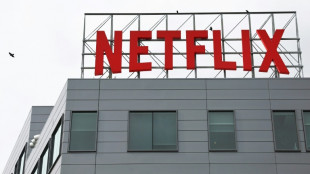
-
 Trump says US 'talking' to China on tariffs
Trump says US 'talking' to China on tariffs
-
Salvadoran soldiers stop US senator near prison holding expelled migrant
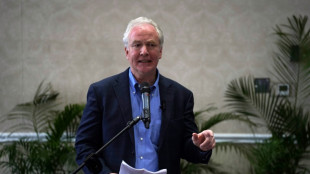
-
 Solanke penalty sends Spurs to Europa League semis
Solanke penalty sends Spurs to Europa League semis
-
CAF crackdown after trouble in African club matches

-
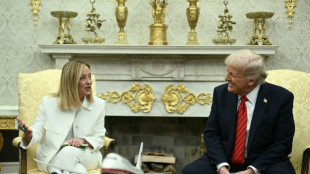 Trump talks up EU tariff deal as Italy's Meloni visits
Trump talks up EU tariff deal as Italy's Meloni visits
-
Trump insists he could fire independent Fed Chair Powell
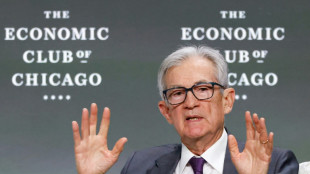
-
 Google has illegal monopoly in ad tech, US judge rules
Google has illegal monopoly in ad tech, US judge rules
-
Trump softens on Zelensky, says mineral deal coming 'soon'
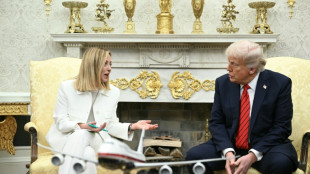
-
 Jacks helps Mumbai beat Hyderabad in IPL
Jacks helps Mumbai beat Hyderabad in IPL
-
Countries must 'make the best' of new multipolar world: IMF chief
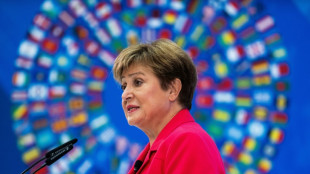
-
 Heavy spring snow storm wreaks havoc in the Alps
Heavy spring snow storm wreaks havoc in the Alps
-
US judge rules against Google in online ad tech antitrust case

Russia's "Alliance" in the Balkans is sinking
Over the past decade, Russia has prided itself on maintaining strong relationships with several Balkan nations. This bond, often rooted in shared Slavic heritage, Orthodox Christian traditions, and historical ties, was once perceived as a strategic platform for Moscow to expand its influence in Southeast Europe. Yet recent developments suggest that Russia’s alliance in the Balkans is beginning to unravel, leaving the Kremlin facing new diplomatic challenges in a region long considered sympathetic to its interests.
Eroding Political Influence
Serbia has historically been Russia’s most steadfast partner in the Balkans, buoyed by a sense of cultural kinship and mutual geopolitical interests. However, Belgrade has gradually moved closer to the European Union, seeking membership and deepening economic cooperation with Western nations. While Serbia has not openly broken away from Russia, analysts point to its growing emphasis on European integration as a signal that Belgrade may be distancing itself from Moscow’s orbit.
Montenegro, once firmly in Russia’s sphere of influence, joined NATO in 2017. This move was seen by many as a major blow to the Kremlin’s strategic goals in Southeast Europe, undermining the perception that the region was decidedly pro-Russian. The country’s pivot toward Western defense structures continues to stand as a stark reminder that Kremlin-friendly governments can rapidly realign when broader interests are at stake.
Economic Factors and Energy Ties
One of Moscow’s most effective levers of power in the Balkans had been its role as a key energy supplier. Gas agreements and oil contracts bolstered Russia’s foothold, offering local governments reliable—if sometimes politically fraught—access to affordable energy. Yet Europe’s ongoing efforts to diversify its energy supply and reduce dependence on Russian resources have started to weaken Moscow’s sway.
In Serbia, plans to link up with alternative pipelines from neighboring countries could mitigate Russia’s longstanding energy dominance. Meanwhile, Bosnia and Herzegovina, another state traditionally viewed as within Russia’s sphere, is actively discussing more diversified energy routes. These shifts dilute Russian economic clout and further complicate Moscow’s capacity to maintain a strong presence in the region.
Shifting Public Opinion
While Russia has long relied on cultural diplomacy to foster goodwill among Balkan citizens, recent surveys suggest a notable shift in public sentiment. The economic and social benefits of closer ties with the European Union—such as access to scholarships, visa-free travel, and foreign direct investment—have made many Balkan citizens view Brussels as a more appealing partner than Moscow.
Moreover, Russia’s military actions on other fronts have prompted anxiety among certain Balkan populations who fear that aligning with Moscow could strain relationships with the West and hinder their own EU accession hopes. In societies where European integration is a near-universal aspiration, it is becoming increasingly challenging for pro-Russian narratives to maintain broad popular support.
Geopolitical Ramifications
Russia’s diminishing influence in the Balkans highlights a broader global trend: competing blocs vying for regional sway, with the EU, NATO, and other Western entities making decisive inroads. For the Kremlin, losing ground in Southeast Europe carries political and strategic consequences that ripple beyond the region. By the same token, Balkan states searching for reliable alliances may shift even more decisively toward Western institutions.
Diplomatic experts note that unless Russia reevaluates its strategy—perhaps by offering new forms of economic or security cooperation—it risks being sidelined in a part of Europe it once considered a reliable staging ground for extending its influence.
Conclusion
As Serbia edges closer to EU membership, Montenegro cements its position in NATO, and other Balkan countries explore alternative partnerships, the solid ties that once bound the region to Moscow are fraying. Historical and cultural connections remain, but for many Balkan governments, the imperatives of economic development and European integration are taking precedence over maintaining a robust alliance with Russia. Unless Moscow adapts its approach, it may find its influence in Southeast Europe reduced to a shadow of its former strength, marking the end of an era in Balkan geopolitics.

The Queen: From Churchill to Yeltsin and Tito to Trudeau

Queen Elizabeth II dies aged 96

Ukraine: Kherson, nuclear inspectors and Russian army

Why Lithuania didn't join the tributes to Gorbachev

Germany: River Rhine water levels could fall to critical low



